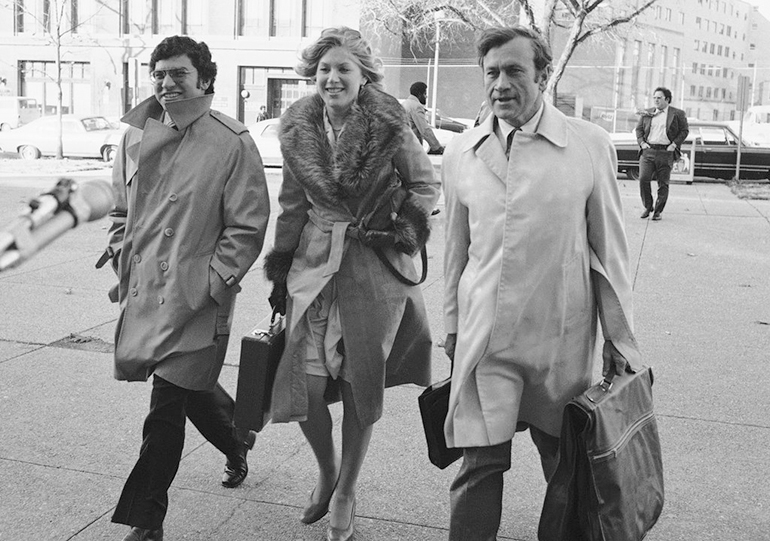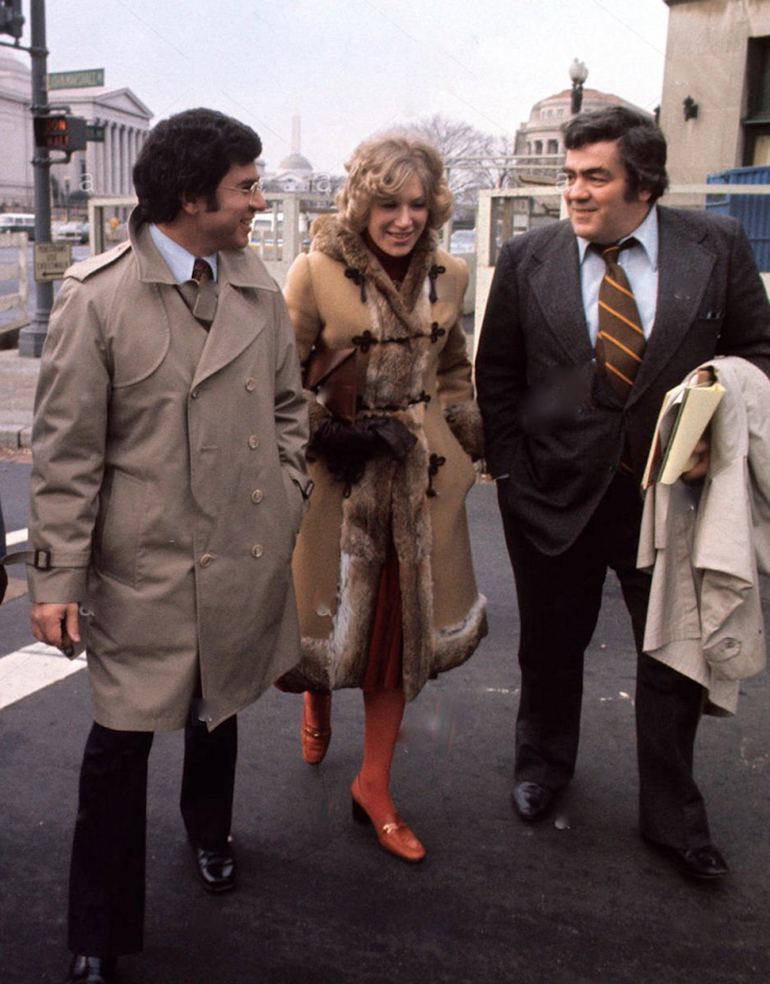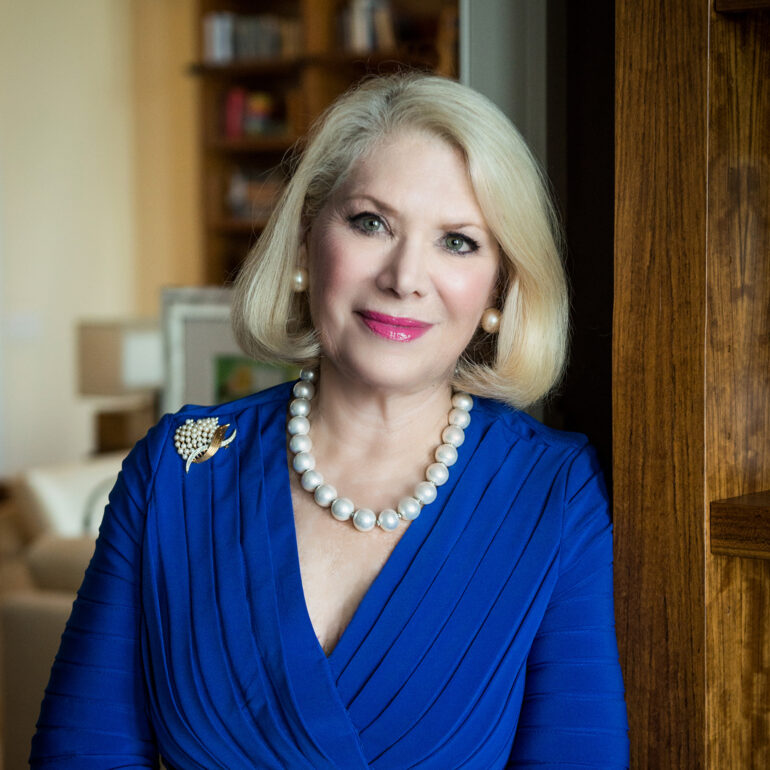While being the sole woman on a legal team prosecuting President Richard Nixon back in the 1970s was a first for this trailblazer, it wasn’t her only first. Jill Wine-Banks’ memoir, due out in 2020, reveals the drama in one of U.S. history’s critical moments, plus her illustrious life and career.
If the internet existed in the 1970s, no doubt Jill Wine-Banks‘ name would have been trending. Wine-Banks, the only female attorney appointed to the Watergate trial team, was a young, whip-smart go-getter who was thrust into the national spotlight when she cross-examined President Nixon’s secretary Rose Mary Woods about the partially erased tapes subpoenaed during the Watergate scandal. Famous for her interrogation of Woods, she was almost as well-known for her looks and fondness for wearing mini skirts, and was often referred to as “the mini-skirt prosecutor.”
Following Watergate, Wine-Banks was determined to be taken seriously by her peers and in her profession. She was appointed the country’s first female General Counsel of the Army under President Jimmy Carter, and later served as the first female executive director of the American Bar Association. She continued to have a thriving career in law as well as in corporate America.
Today, Wine-Banks has retired from public service and the legal profession, but remains busy writing a memoir scheduled to be published in May 2020 (Holt Publishing), serving as a regular legal expert for MSNBC, and traveling the country as a public speaker. She is also active in her hometown of Chicago by being involved in organizations supporting public education, watchdog advocacy, and homelessness.

Let’s talk about your memoir, coming out in the spring of 2020. Any secrets you intend to reveal in the book?
Much of the book covers my years on the special prosecution team for Watergate, beginning in May 1973 when I was appointed to the team, and covers the time period to January 1975, when we secured a guilty verdict. The last chapter in my book covers the aftermath of Watergate to 1980, when I moved back to Chicago and married my husband. There’s also one chapter covering my 45 years since Watergate ended.
In the book, I capture the drama of the Watergate period and what it was like to hear the stolen tapes before anyone else. There were unexpected twists and turns. Right after Jim Neal, who was my boss and the prosecutor serving right under Archibald Cox, temporarily left the team, the Saturday Night Massacre occurred. It was a surprise to me, as well as another colleague, that we were basically left in charge at what turned out to be a crucial time in the process. We were so young!

I like to think of my story as a mash-up of Cheryl Strayed’s account of her journey in “Wild” and the drama behind “All the President’s Men.” I hope it is a book with which other women will be able to resonate and shows my personal side versus my public persona.
How did the Watergate experience change your feelings about government?
I was raised in a family that strongly believed in democracy and the presidency. Therefore, I found it even more astounding — and depressing — that President Nixon ended up being a crook. I feel that there are parallels going on with what happened back then and what is happening today.
Do you consider yourself an advocate for women’s rights?
Absolutely. My book is replete with sexism examples. Every time I was referred to as a female lawyer by a colleague, it made me feel like an outsider in my own profession. I didn’t particularly care for my label as a “mini-skirted prosecutor” either, but mini skirts were what we wore in those days.
When I first became a lawyer, only four percent of all attorneys were female. After I joined the Department of Justice, I was only given appeal cases, not trials. I asked my boss to put me on a trial, and ended up being the first female prosecutor on a trial for organized crime.
I hope that people, especially women, will relate to how I dealt with the problems I encountered with sexism and being one of only a handful of female attorneys in my younger days.

If you had a piece of advice for young female attorneys just getting started in their careers, or any young woman for that matter, what would it be?
Take on whatever you want, but be aware of your surroundings. The power structure is still dominated by men, but women can gather tools and learn strategies to help themselves. I recommend reading Deborah Tannen’s book “Talking from 9 to 5,” in which the author talks about the importance of verbal tone and striking a balance that enables women to be heard, not ignored.
Also, don’t be afraid to lean on other women. When I moved back to Chicago, I joined the American Bar Association instead of the Women’s Bar Association because I thought I would be taken more seriously. But I eventually did join The Chicago Network and you know what? I made some great associations with other women, and we provided strength to each other. Forty years later, I am still friends with those same women and we always make time for each other.

You like to wear decorative pins on your outfits when you appear on MSNBC. How did that get started and how do you collect them?
I’ve always loved pins. I wore them during my time on the Watergate case. I have one on in my high school graduation photo. When I first came to MSNBC, I noticed all the men were wearing flag pins, but I thought I could do better. The first pin I wore on the air said “Defend America” and I got a message on Twitter about it. From then on, each and every pin I wear has to be relevant to the news of the day. My pins now have their own Instagram fan page.
I shop for my pins at flea markets and antique stores, but I’ve also received hundreds of pins from fans all over the world. One fan sent me a pin with a woman in a trench coat making a call inside a phone booth, but when the tiny door is opened you can see she is wearing a Superwoman-like outfit, so I wore that in honor of all the superwomen in Congress and on the Supreme Court. It’s one of my favorites. My pins tell the story of what is going on with people in the world, including the Trump administration.
You are born and raised as a Chicagoan, but have worked all over the world. What is it about Chicago that feels like home to you?
After living in New York and Washington D.C., I moved back to Chicago primarily because of my husband, who is an antique dealer. Of course, my family is here, too. When I returned, I really grew to appreciate what a great city Chicago is, and it’s gotten better in the years I’ve been back. We have everything anyone could want — great theater, ballet, opera, restaurants, and a beautiful lakefront. No earthquakes or hurricanes, either.
Are there any Chicago charities that you like to support?
I’ve been on a number of boards, but of note is my association with the Better Government Association (BGA), which does wonderful work to keep our public officials accountable. I’ve also served on the boards of Executive Service Corps, The Chicago Network, International Women’s Forum, and the ACLU. I support my alma mater, UIUC, a number of animal protection organizations, and am on the board of advisors for Governors State University; it is run by a phenomenal woman who is a higher education advocate and has transformed the school by making it a four-year residential campus. I also support The Ark and Sarah’s Circle, which enables homeless women in Chicago to move into affordable housing.
 Donna Berry Glass is a freelance writer in Marin County who writes mostly about family and kid-oriented topics. When she’s not writing, she enjoys spending time with her family exploring the natural beauty of Marin, snuggling with her Cavalier King Charles spaniel while reading a good book or whipping up something delicious in her space-challenged kitchen. Donna is a supporter of the California Academy of Sciences, a world class science museum and research institution, and the Institute on Aging which provides much needed services to seniors and disabled individuals.
Donna Berry Glass is a freelance writer in Marin County who writes mostly about family and kid-oriented topics. When she’s not writing, she enjoys spending time with her family exploring the natural beauty of Marin, snuggling with her Cavalier King Charles spaniel while reading a good book or whipping up something delicious in her space-challenged kitchen. Donna is a supporter of the California Academy of Sciences, a world class science museum and research institution, and the Institute on Aging which provides much needed services to seniors and disabled individuals.

